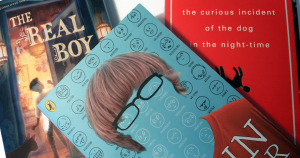
(Not) Engaging with Disability: Convenient Approaches in SFF
Magic and technology often minimize disability in SF/F. How can authors meaningfully engage with disability and the ways that speculative elements can affect disabled characters?

Magic and technology often minimize disability in SF/F. How can authors meaningfully engage with disability and the ways that speculative elements can affect disabled characters?

The world does its best to remove our autism from the mainstream narrative of life, hiding either it or us whenever possible. In the world of fiction, we often see these same attempts.

After our rave review of Cindy Rodriguez’s debut When Reason Breaks—about two very different girls who are both dealing with depression—we were excited to invite both reviewer and author to the website this week to discuss the book further.

Although I can’t recommend it wholeheartedly, Louder Than Words features a well researched, realistic portrayal of progressive mutism.

A one-armed astronaut superhero is the lead in Dangerous, the unusual new novel by NYT bestselling and Newbery Honor-winning author Shannon Hale, who sat down with us for a great interview.

The two or three months I managed to get by on the reduced dose were enough to convince me: My psychiatrist is lying. I don’t need medication. I’m fine. I can beat this. Until, of course, I couldn’t.

An estimated 1 in 7 women suffer from chronic pelvic pain; it’s bizarre and disappointing that despite these statistics, there are distinctly zero characters with this condition.

The most common wheelchair-using character has acquired paraplegia, but why is this particular narrative so prevalent, and at the expense of all others?

Here is a key insight to creating realistic autistic characters: We do not do the visibly autistic things we do because of “autism,” full stop. Like non-autistic people, we are responding to our experiences of the world. Those experiences simply differ from those of non-autistic people.

I’ve talked a lot about the ways my disability has affected my body image, my sexuality, my confidence, and my social interactions, and all of those things are important to consider when writing a disabled character. Today, however, I want to focus on the ways my disability affects the logistics of my life.